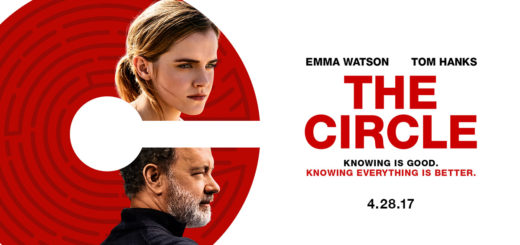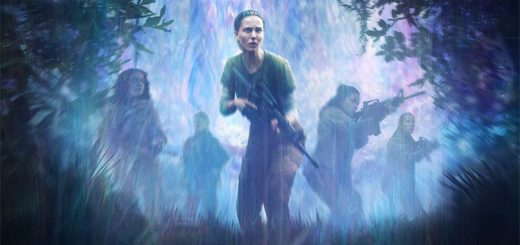FINDING DORY Review
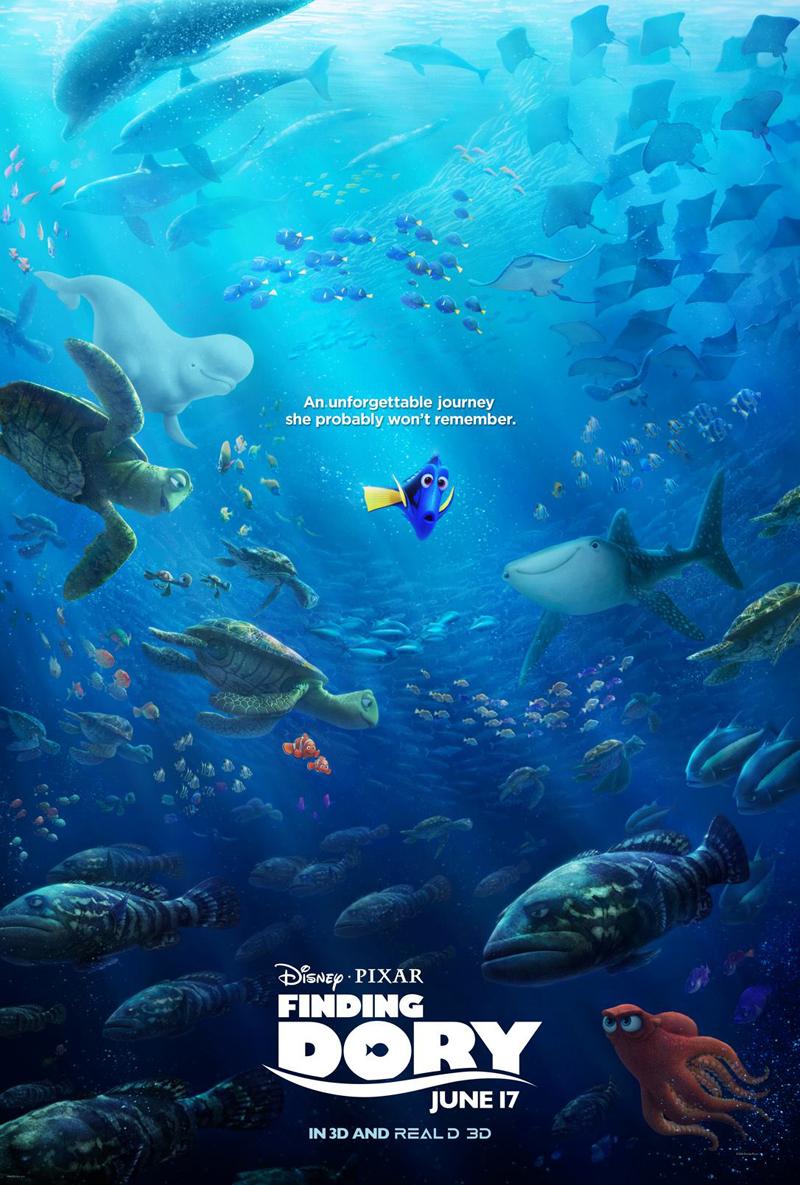
Director: Andrew Stanton, Angus MacLane
Genre: Animation/Family
Year: 2016
“Don’t quit your day job” is a phrase I hear a lot as an aspiring screenwriter. Most creative types understand that sometimes you have to keep food on the table, but on the other hand, you don’t see Leonardo DiCaprio slinging hamburgers, do you? FINDING DORY brings Pixar’s docket of mostly impressive animated feature films to a whopping 17. You’re not a starving artist anymore, Pixar. It’s time for you to quit your day job of cranking out half-hearted sequels and focus full-time on creating classics.
The much-anticipated sequel to FINDING NEMO (2003) sees the return of the entire coral reef gang and much of the original voice cast, only this time the focus is on forgetful sidekick Dory and her search for her parents that she suddenly remembers.

Like the day of your Mom’s birthday… every year
Dory’s optimism and charm certainly make her likable enough to support her own feature, but her real defining characteristic is her trademark forgetfulness. Dory’s “short term memory loss” was equal parts endearing and hilarious in the first film, so it was interesting to see how Pixar would translate this into a feature-length concept. Many of us expected something along the lines of Maritime Memento, but instead we got something… else.
Pixar pulls no punches when it comes to depressing opening sequences and I say bring it on. However, the opening scene here with Baby Dory (easily Pixar’s most adorable creation since WALL-E) and her parents struggling to cope with her memory loss is a different animal. Little Dory constantly apologizes for her forgetfulness while her parents pour out love and encouragement on her as they try to help her with little games and exercises. A sequence of young Dory having lost her parents approaching various fish for help, only to gradually forget what she is looking for in the first place is downright tragic. The thing is, we’ve all been laughing at Dory’s forgetfulness (see: disorder) for almost ten years. To turn it into something like this is certainly noble, particularly once you factor in the clear parallels to the similar issues facing families dealing with diagnoses of disorders and disabilities, but watching it leaves the viewer feeling a little gross.
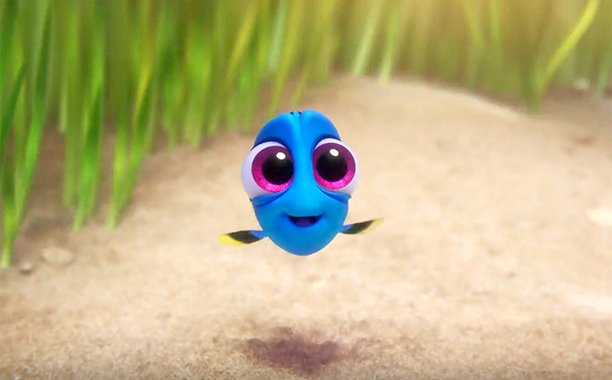
Look at her. You hurt her. YOU did.
It isn’t so much an intentional guilt trip on Pixar’s part; the unease really comes more from a violation of the world of story — a cardinal sin for Pixar. For ten years the rule of the world of FINDING NEMO has been “Dory’s forgetfulness is cute and funny!” It allowed her to play off of Marlin’s spiraling neuroticism in a way that forced him to grow. Now, in the first two minutes of the film, Pixar brings the hammer down to say “Nope! This is no longer funny! Nevermind!” Bad form, Pixar.
This level of — dare I say — sloppy world-building is present throughout the film. Dory’s forgetfulness is the core of making this story work, but the rules are not clearly defined. There’s no explanation for why she suddenly begins to remember things from her past, and all of her memories just sort of… happen. It usually goes like this: Dory encounters a problem/obstacle, she sees or hears something that triggers a memory revealing exactly the solution to the problem/obstacle, she convinces whoever’s hanging around her at the time that this is the right thing to do, and we’re off to the races where everything works out fine. It’d be one thing if this happened, say, once or twice in a way that the entire plot didn’t hinge on, but it happens constantly over the course of the movie. And the entire plot does hinge on it.
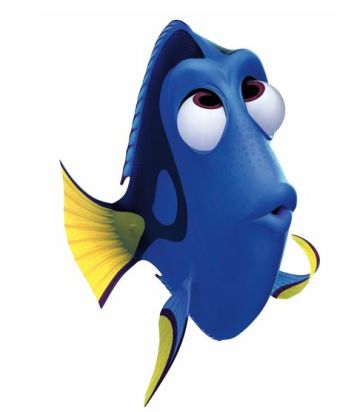
Deus Ex Marina
Perhaps an even bigger violation here is the rewriting of what impact fish can possibly have on the human world — another core facet of this franchise. I don’t even understand how this happened, so I’ll just go ahead and say it: an octopus drives a truck in this movie. It literally drives a truck. On the freeway. I hate to harp on the original so much, but NEMO also featured a scheme that a real life fish could not have possibly come up with. However, we believe Gil’s aquarium escape plan because it incorporates a routine he’s familiar with and objects in his environment. Don’t get me wrong, octopi are really smart, but driving a truck? I can’t even drive a truck!
To go a little further, a lot of the writing in this film feels thrown together. More often than not, all the characters explicitly state what they feel. Nemo’s journey seems to have had a real positive impact on him, because instead of being an petulant brat he’s now basically Kid Christ. Marlin, on the other hand, has regressed completely and still feels the need to shelter and protect that he apparently has not dealt with from the first film. A shoehorned subplot where Nemo and Marlin have a back-and-forth about whether or not Dory is capable of handling herself is not interesting, certainly not as interesting as Dory and Marlin’s dynamic from the first film.
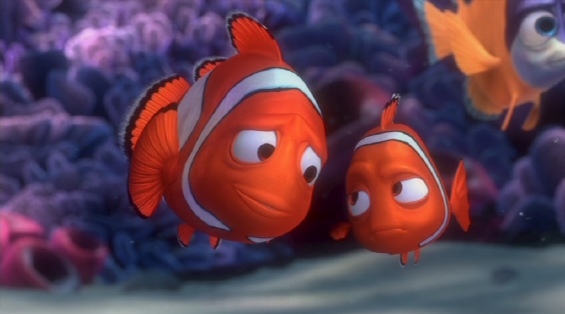
“You are wrong, father”
“You are right, son”
“Dad”
Pepper in some not-quite-fleshed-out-enough-to-be-interesting side characters (Caitlin Olson Whale’s entire character arc is stricken from this film, so don’t get your hopes up like I did.) and you’ve got quite the sleeper of a Pixar movie on your hands. To this movie’s credit, the set pieces are kind of fun when they don’t leave you scratching your head and the animation is as gorgeous as any Pixar film would be — but this film pales in comparison to the original NEMO and most of Pixar’s existing catalog.
At the end of the day, I can forgive a mediocre film every now and then if it means I get an INSIDE OUT or a WALL-E every couple years. But, in my opinion, save your 15 bucks for when one of those comes out.
Verdict: Do Not Recommend

